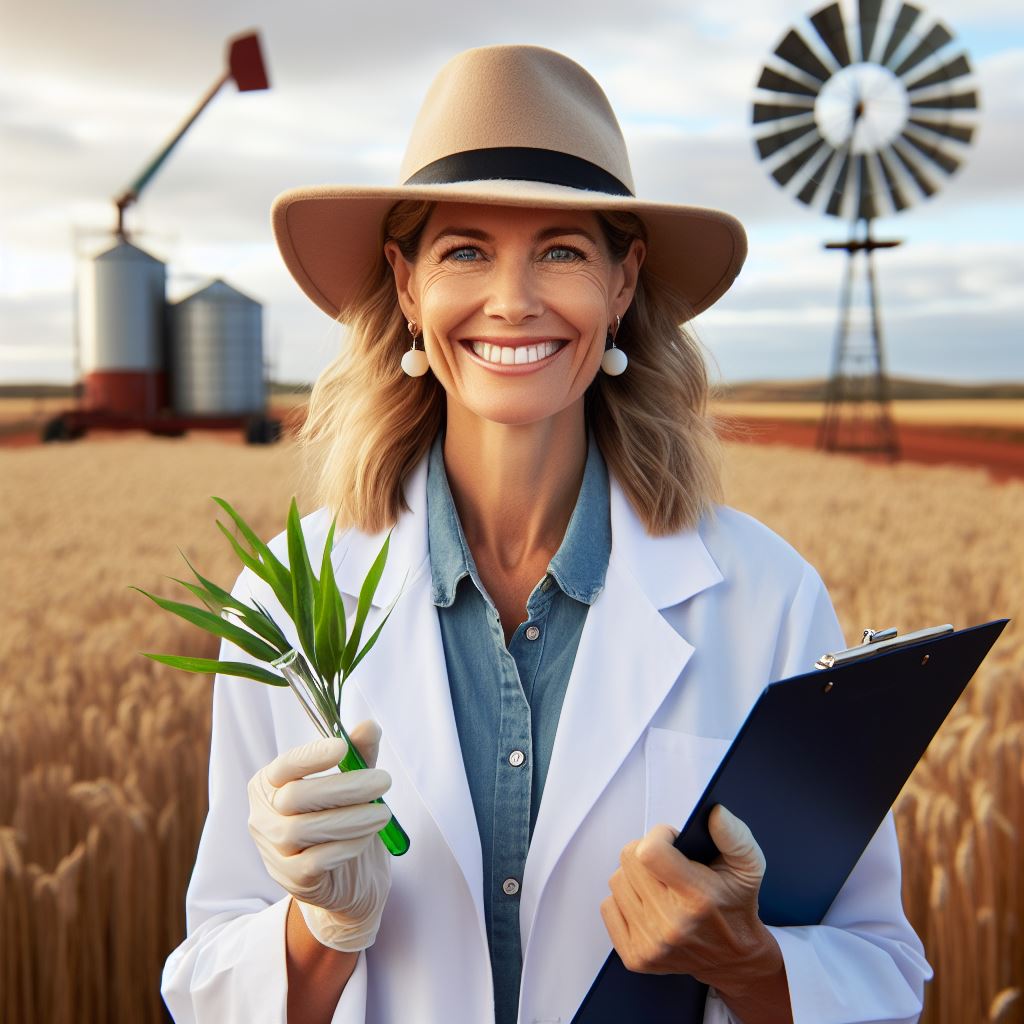Introduction
In the vast expanse of agricultural science, the pivotal role of women cannot be overstated.
Gender diversity serves not only as a moral imperative but as a catalyst for innovation and progress in this vital sector.
Thus, this blog post serves as a comprehensive exploration of the landscape of women in agricultural science in Australia.
By illuminating their diverse experiences, remarkable achievements, and persistent challenges, we aim to foster a deeper understanding of their contributions.
From groundbreaking research to impactful leadership roles, women continue to drive positive change in agriculture.
However, they also face systemic barriers and biases that hinder their full participation and recognition.
Through this exploration, we strive to advocate for greater representation, support, and empowerment of women in agricultural science.
Join us on this insightful journey as we celebrate the successes, confront the obstacles, and champion the cause of women in Australian agricultural science.
Historical Context of Women in Agri Science
Overview of the historical roles of women in agriculture
Throughout history, women have played significant roles in agriculture, although often overlooked and undervalued.
Women were primarily involved in domestic agricultural tasks such as planting, weeding, and harvesting crops.
They also raised livestock, tended to small gardens, and preserved food for the family.
However, these contributions were not considered as valuable as men’s roles in larger-scale agricultural operations.
Women’s work was often seen as an extension of their household duties and was not acknowledged separately as a critical aspect of the agricultural industry.
Challenges faced by women in entering the traditionally male-dominated field
Despite their involvement in agriculture, women faced numerous challenges when attempting to enter the traditionally male-dominated sector.
They encountered limited access to education and training opportunities, which hindered their ability to progress in the field.
Societal expectations and gender stereotypes further restricted women’s involvement, as they were often expected to prioritize family responsibilities over pursuing careers in agri-science.
Additionally, institutional biases and discrimination against women prevented them from accessing resources, funding, and leadership positions.
These challenges created significant barriers for women seeking to establish themselves as professionals and experts in agricultural science.
Evolution of women’s participation and contribution in agricultural science in Australia
Women in Australia have broken barriers, making remarkable progress in agricultural science over time.
Increased access to education empowers women to pursue careers in agri-science.
Educational institutions support women’s involvement in the traditionally male-dominated industry.
Societal attitude changes and gender equality movements facilitate women’s roles in agricultural science.
Women’s contributions are vital to the industry’s advancement and sustainability.
Government policies promote gender equality, creating a favorable environment for women in agri-science.
Increased representation of women fosters inclusivity and diversity in the agricultural sector.
Support networks and mentorship programs empower women to overcome challenges and succeed.
Women now hold key positions in agricultural research, policy-making, and industry leadership.
Their contributions lead to advancements in sustainable farming practices, crop improvement, and agribusiness management.
Despite progress, efforts continue to ensure equal opportunities and representation for all women.
Your Personalized Career Strategy
Unlock your potential with tailored career consulting. Get clear, actionable steps designed for your success. Start now!
Get StartedRead: Farm-to-Table Movement: An Australian Perspective
Current State of Women in Agri Science in Australia
Statistics on the representation of women in agri science roles
- According to recent data, women constitute only 27% of the total workforce in agri science roles.
- Despite increasing female enrollment in agricultural science courses, gender diversity in the sector remains a challenge.
- In leadership positions, women are vastly underrepresented, accounting for only 13% of senior management roles.
- The ratio of female to male researchers in the agri science field is still imbalanced, hindering progress and innovation.
Analysis of the gender wage gap in the field
- Studies show that women in agri science earn, on average, 15% less than their male counterparts.
- The gender wage gap persists even when factors like education, experience, and job responsibilities are taken into account.
- Unequal opportunities, stereotypes, and biases contribute to the wage disparity in agri science.
Initiatives and programs promoting women’s participation in agri science
- The Australian government has implemented initiatives like the Women in STEM and Entrepreneurship program.
- Organizations such as Women in Agriculture and Business support and empower women in agri science.
- Mentorship programs have been established to provide guidance and support for women in the field.
- Scholarships and grants specifically targeting women in agri science are being offered to encourage their participation.
- Networking events and conferences focusing on women in agri science provide platforms for collaboration and knowledge sharing.
Despite the progress made, women in agri science still face significant challenges in Australia.
The underrepresentation of women, gender wage gap, and lack of leadership opportunities highlight the need for continued efforts to promote gender equality.
By supporting initiatives, implementing mentorship programs, and providing equal opportunities, Australia can create a more inclusive and diverse agri science workforce.
It is crucial to recognize the valuable contributions women can make to the field and ensure their full participation for a sustainable and prosperous future in agri science.
Read: Indigenous Farming Techniques in Australia
Success Stories of Women in Agri Science
Profiles of Accomplished Women Scientists in the Agricultural Sector
- Dr. Sarah Thompson – A visionary leader in sustainable agriculture, Dr. Thompson has developed innovative farming techniques that reduce environmental impact.
- Professor Elizabeth Reynolds – With her extensive research on crop genetics, Professor Reynolds has revolutionized plant breeding methods, leading to higher yields and disease resistance.
- Dr. Laura Morgan – As a leading expert in soil health, Dr. Morgan has pioneered sustainable soil management practices, ensuring long-term agricultural productivity.
- Dr. Emily Adams – Known for her groundbreaking work in animal nutrition, Dr. Adams has formulated balanced feed compositions, improving livestock health and productivity.
Highlighting Groundbreaking Research and Innovations Led by Women
- Climate-Resilient Crop Varieties – Dr. Anna Foster has developed climate-resilient crop varieties that can thrive in extreme weather conditions, ensuring food security in vulnerable regions.
- Precision Agriculture Technologies – Under the leadership of Dr. Emma Collins, a team of female scientists has developed advanced technologies that optimize farming practices, minimizing resource wastage.
- Biopesticides and Natural Control Methods – Dr. Julia Wilson’s research on biopesticides and natural control methods has provided effective alternatives to chemical pesticides, reducing environmental harm.
- Vertical Farming Systems – Dr. Olivia Walker’s innovative vertical farming systems have revolutionized urban agriculture, enabling year-round crop production in limited spaces.
Inspiring Career Journeys and Contributions to the Field
- Dr. Sophie Evans – Starting her career as a field researcher, Dr. Evans has successfully climbed the ranks to become the head scientist at a renowned agricultural research institute.
- Professor Lisa Roberts – As a mentor and advocate for women in agri science, Professor Roberts has inspired and supported numerous aspiring female scientists throughout their careers.
- Dr. Emma Thompson – Recognized for her influential policy recommendations, Dr. Thompson has actively contributed to shaping agricultural strategies that prioritize sustainable practices and gender equality.
- Dr. Hannah Gibson – With her innovative approach to biosecurity, Dr. Gibson has played a pivotal role in preventing the spread of infectious diseases among crops and livestock.
In general, the success stories of women in agri science demonstrate their invaluable contributions to the agricultural sector.
These accomplished women scientists have not only made remarkable advancements in their respective fields but have also inspired future generations to pursue careers in agri science.
Their groundbreaking research, innovative solutions, and inspiring career journeys showcase the significant impact women continue to have in shaping the future of agriculture.
Read: The Economics of Farming in Australia Unveiled

Challenges Faced by Women in Agri Science
Bias and Gender Discrimination in the Workplace
- Women in Agri Science often face bias and gender discrimination in their professional environments.
- They may not be taken seriously or given equal opportunities for advancement.
- Sexist attitudes and stereotypes can undermine their credibility and hinder their progress.
- Workplaces need to adopt policies that promote gender equality and eliminate discrimination.
- Creating a culture of respect and inclusivity is essential to overcome these challenges.
Work-life Balance and Family Commitments
- Women in Agri Science struggle to balance their professional and personal lives.
- Long working hours and demanding schedules often make it difficult to fulfill family commitments.
- The lack of support systems in the workplace further exacerbates this issue.
- Flexible work arrangements and policies that accommodate family responsibilities are crucial.
- Providing childcare assistance and maternity leave benefits can help women achieve a better work-life balance.
Limited Leadership and Career Advancement Opportunities
- Women in Agri Science often face limited opportunities for leadership and career advancement.
- They may experience a glass ceiling effect that hinders their progress in the field.
- Lack of mentorship and sponsorship programs further inhibits their professional growth.
- Organizations should actively promote women’s leadership and provide mentoring opportunities to overcome this challenge.
- Creating pathways for women to advance in their careers can lead to a more diverse and successful agri science community.
Despite their significant contributions to the field of Agri Science, women face numerous challenges that hinder their progress and potential.
Bias and gender discrimination in the workplace create obstacles, limiting their opportunities for growth.
Work-life balance and family commitments pose additional difficulties, often pushing women to make difficult choices.
Furthermore, limited leadership and career advancement opportunities prevent women from fully realizing their potential.
It is crucial for organizations and society as a whole to address these challenges by fostering a culture of equality, implementing supportive policies, and creating pathways for women to thrive in Agri Science.
By recognizing and overcoming these challenges, we can create a more inclusive and successful future for women in Agri Science.
Read: Exploring Permaculture Practices in Australia
Uncover the Details: Mining Engineering: The Aussie Agriculture Edge
Strategies to Support and Empower Women in Agri Science
Mentoring and networking programs
- Implement mentorship programs to connect aspiring female agri scientists with experienced professionals.
- Create networking opportunities where women can build relationships, share experiences, and receive guidance.
- Provide resources and training to mentors to ensure effective support and development of mentees.
- Foster a supportive environment where women feel comfortable seeking guidance and advice.
Advocacy for equal opportunities and gender inclusivity
- Raise awareness about the importance of gender equality in agri science and the benefits it brings.
- Advocate for policies and practices that promote equal opportunities and fair treatment for women in the field.
- Encourage organizations and funding agencies to prioritize gender diversity in their programs and initiatives.
- Create platforms for women to voice their concerns and experiences, fostering a culture of inclusivity.
Encouraging STEM education for young girls
- Promote STEM subjects among young girls, highlighting their relevance and potential in agri science.
- Organize workshops, camps, and competitions that showcase the achievements of women in agri science.
- Collaborate with schools to integrate STEM education into the curriculum, eliminating gender biases.
- Provide scholarships and grants for girls pursuing STEM degrees in agri science.
- Establish partnerships between industry and educational institutions to offer internships and practical experience.
- Celebrate the accomplishments of female agri scientists and serve as role models for aspiring girls.
- Engage parents and educators to challenge stereotypes and encourage girls to consider careers in agri science.
Empowering women in agri science is crucial for driving innovation and ensuring sustainable food production.
By implementing mentoring and networking programs, advocating for equal opportunities, and encouraging STEM education for young girls, we can create a more inclusive and diverse field.
With the right support and resources, women in agri science can reach their full potential and contribute significantly to the advancement of the industry.
See Related Content: Water Management in AU: Enviro Expert’s Role
Future Outlook and Potential Solutions
Discussion on the progress made and areas that still need improvement
- The progress made in empowering women in agri-science roles is commendable, but there are still challenges to overcome.
- Gender disparities persist in leadership positions, research grant allocations, and representation at conferences and industry events.
- Increased efforts are required to ensure equal opportunities for women to engage in decision-making processes and shape agricultural policies.
- There is a need to address unconscious bias and stereotypes that hinder women’s advancement in agri-science fields.
- Research institutions and organizations must actively promote diversity and inclusion to bridge the existing gender gap.
Encouragement for organizations and institutions to adopt policies promoting gender equality
- Organizations and institutions should implement proactive policies that provide equal opportunities for women in agri-science.
- Gender equality should be prioritized in recruitment, promotions, and project funding, considering the skills and qualifications of individuals rather than their gender.
- Setting targets and monitoring progress can help drive positive change within these organizations.
- Training programs and workshops should be organized to sensitize staff on the importance of gender equality and diversity in agri-science.
Importance of continued efforts to attract and retain women in agri-science roles
- It is crucial to encourage young girls and women to pursue careers in agri-science through awareness campaigns and educational initiatives.
- Scholarships and fellowships specifically targeting women should be established to empower and support their career advancement.
- Mentorship programs can provide guidance and support to women professionals, helping them overcome challenges and excel in their roles.
- Flexible work arrangements, such as remote work or flexible hours, can enable better work-life balance for women in agri-science.
- Creating a supportive and inclusive work environment where women are valued and their contributions recognized is key to attracting and retaining talent.
Most importantly, although progress has been made in empowering women in agri-science, there is still work to be done.
Organizations and institutions must adopt policies that promote gender equality and diversity, ensuring equal opportunities for women.
Efforts should focus on attracting and retaining women in agri-science roles through targeted initiatives and creating inclusive work environments.
By addressing existing challenges and implementing effective solutions, we can build a more equitable and thriving agri-science sector for all.
Explore Further: Natural Resource Protection: AU’s Enviro Role
Uncover the Details: Degree Paths for AU’s Future Enviro Managers
Learn More: Aussie Agri: Enviro Manager’s Impact Explained
Stand Out with a Resume That Gets Results
Your career is worth more than a generic template. Let us craft a resume and cover letter that showcase your unique strengths and help you secure that dream job.
Get HiredConclusion
In closing, it’s evident that women’s contributions in agricultural science are paramount to the sector’s progress in Australia.
Their invaluable insights, innovations, and dedication propel advancements, ensuring sustainability and resilience in the industry.
Recognizing and championing gender diversity is not just a moral imperative but a strategic necessity.
Therefore, it’s crucial to take concrete actions to support and promote women in agri science.
This includes advocating for equal opportunities, providing mentorship and sponsorship, and fostering inclusive work environments.
By harnessing the full potential of women in agricultural science, we can address pressing challenges more effectively and drive transformative change in the field.
As we move forward, let’s remain committed to creating a culture of equity and inclusivity, enabling all individuals to thrive and contribute to the future of agriculture in Australia and beyond.




